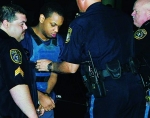21 July 2011
Soldier tells of shooting at Arkansas recruiting post
 (AP) — Pvt. Quinton Ezeagwula was smoking a cigarette outside a military recruiting station in Arkansas when a black truck pulled up, its window half-open
(AP) — Pvt. Quinton Ezeagwula was smoking a cigarette outside a military recruiting station in Arkansas when a black truck pulled up, its window half-open
"Somebody was talking, but I couldn't make out what he was saying," Ezeagwula said. He turned to his friend, Pvt. William Andrew Long, who didn't recognize the man either.
Then, the window rolled down the rest of the way, exposing an assault rifle.
"Next thing I know it's being fired off," Ezeagwula said Wednesday at the trial of the man accused of shooting him. Long fell and didn't get back up; Ezeagwula stumbled and made it inside.
Abdulhakim Muhammad, 26, is charged with capital murder for killing Long and attempted capital murder for wounding Ezeagwula in 2009. He has admitted to the shooting, but says he was justified because of U.S. military action in the Middle East. His defense lawyers say he is mentally ill. If they can't win his acquittal, they hope to keep him off death row.
Before the shots were fired, Ezeagwula, then 18, was on a break outside the Little Rock recruiting center with Long, a 23-year-old soldier he met there. Neither had seen combat; they'd only just completed basic training.
In the parking lot, Long's mother, Janet, was waiting in her car. She'd dropped her son off that morning, but never got to take him home.
Instead, she heard gunshots ring out and ducked.
"It took me a while to realize it was Andy," she testified Wednesday.
Once she did, she ran toward the station, but a recruiter blocked her path.
"I couldn't get to my son," she said.
Ezeagwula, wounded by the gunshots, was looking at Long.
"I seen him fall to the ground," he said. Ezeagwula took a few steps and made it inside the building. He saw papers flying after some of the shots punctured the walls.
He touched his hand to his head and saw blood. He fell to the ground. Soon, someone cut off his military uniform and applied pressure to his wounds.
As Ezeagwula spoke Wednesday, John Johnson, a deputy prosecutor, held up photos of his wounds. Ezeagwula wore the same type of Army fatigues he had worn the day of the shooting, even though Muhammad's father, Melvin Bledsoe, had asked the judge not to allow anyone to testify in uniform.
Two years after the shooting, Ezeagwula still has shrapnel in his body. He had yet another surgery at the beginning of the year.
"I got a slight limp, but I just play it cool," he said.
When Ezeagwula finished testifying, he sat down next to Long's father, Daris.
Earlier that day, Johnson asked Long's mother if her son died serving his country. Long paused.
"Well, he was serving when he was killed," she said.
Shortly before her testimony ended, Johnson approached her and pulled an item from a plastic bag. Gently, she took the chain and small metal plates that used to hang around her son's neck.
"These are dog tags," she said and held them until the judge excused her. When she returned to her seat, her husband put his arm around her.
In his opening statement Wednesday, Muhammad's attorney said his client snapped after seeing a radical video that allegedly showed an American soldier committing "atrocities" against a fellow Muslim.
"He gets fired up. He gets mad about it," defense lawyer Patrick Benca said.
Benca said Muhammad packed up items from his Little Rock apartment, threw in a couple boxes of Cheez-Its and a few cans of fruit, made a couple of Molotov cocktails and drove to Kentucky, where a soldier in the video was supposedly from.
A recruiting center there was closed, so Muhammad drove to Nashville, Tenn., and tried to firebomb the home of a rabbi, Benca said. But the rabbi wasn't there anymore, so in frustration, Muhammad drove all night back to Little Rock, where he remembered there was a recruiting station on the city's west side.
"He goes over there with his gun..." Benca said. "He kills Pvt. Long and injures Pvt. Ezeagwula."
Benca said Muhammad used to be a reliable son, pointing out historic sites in Memphis, Tenn., for his father's tour bus company.
"He was fun. He was a jokester," Benca said.
But at 18, something changed. "His friends started saying he was acting strange," Benca said.
He started looking into religions outside his parents' Baptist faith — Catholicism, Buddhism, Islam — and became a Muslim in college. He changed his name from Carlos Bledsoe to Abdulhakim Muhammad. And in 2007, he traveled to Yemen, where extremists are known to seek sanctuary.
"People in the Muslim religion don't even go to Yemen," Benca said Wednesday.
He overstayed his visa and was deported back to the U.S. When he returned to Memphis, he was different, Benca said. He distanced himself from his family and event slept in his car.
"He'd rather do that than spend time with his family and friends," Benca said.
Prosecutor Larry Jegley told a different story, saying Muhammad suffers from no mental defect and coldly killed Long and wounded Ezeagwula.
"We're here because this man did it," Jegley said, pointing to Muhammad.
Muhammad had hoped for a high-profile federal or military trial, but landed in a county courthouse where prosecutors decided early on they would seek his execution. Arkansas has executed 27 prisoners since 1988; the federal government has executed three.
"Pvt. Long won't walk amongst us ever again," Jegley said. "Pvt. Ezeagwula won't walk as comfortably."
20:46 Posted in UNITED STATES | Permalink | Comments (0) | ![]() Facebook |
Facebook |



















The comments are closed.